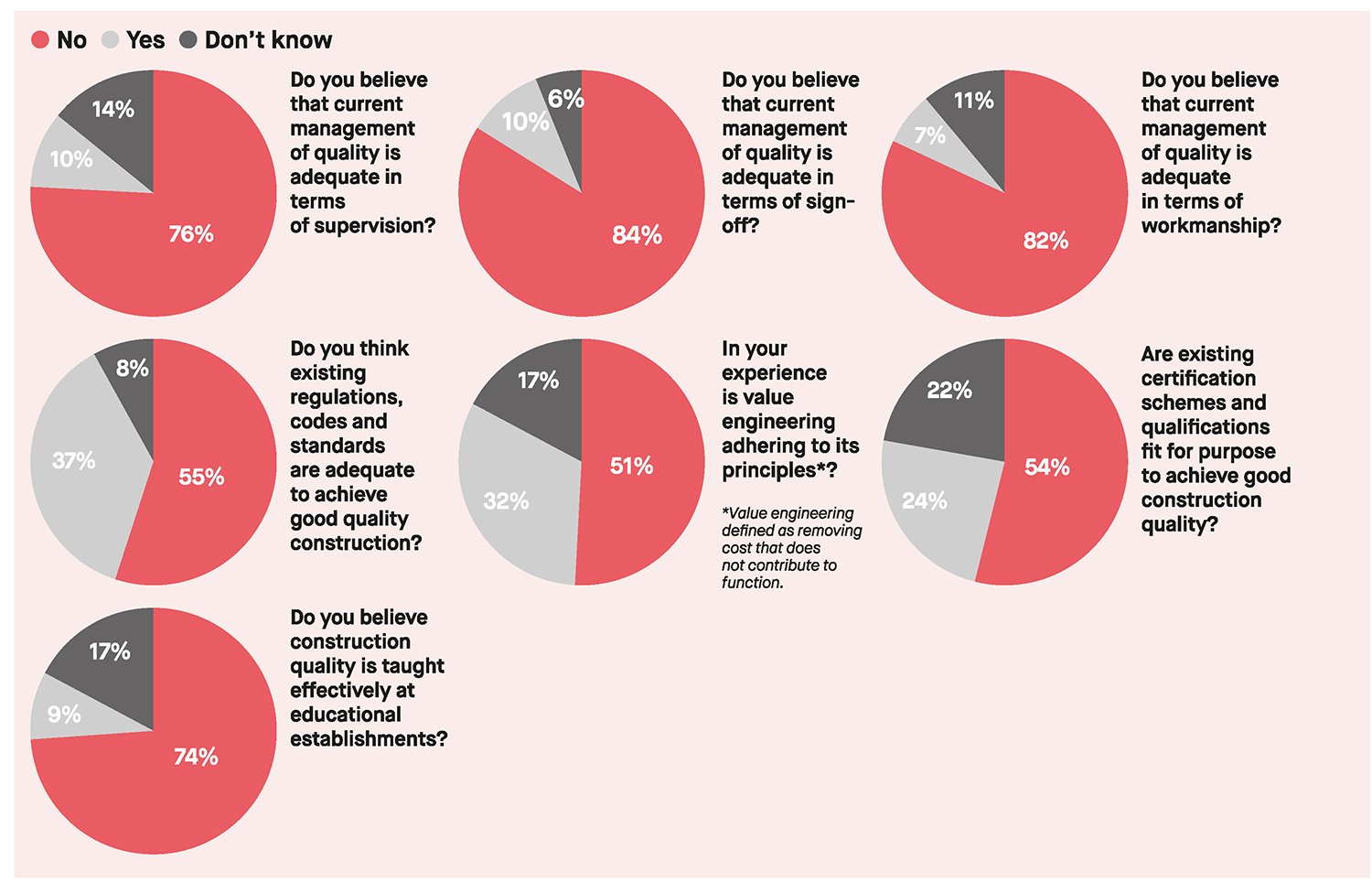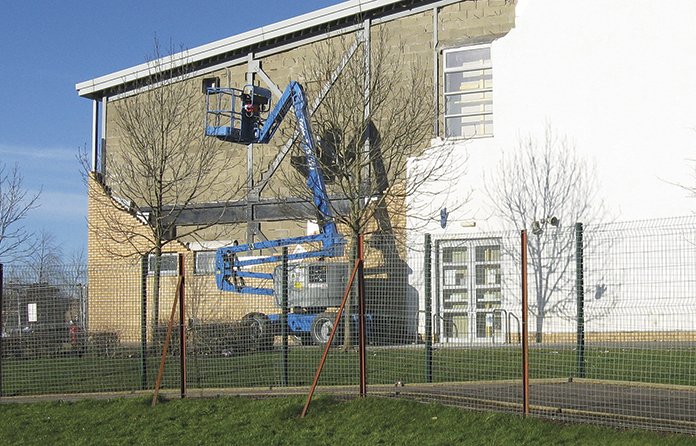Article written by Will Mann, Construction Manager 28th February 2018
The findings from the CIOB ‘call for evidence’, which will be shared with the Hackitt Review and the Grenfell Inquiry team, present a damning picture. Will Mann reports.
More than three-quarters of construction professionals believe the industry’s current management of quality is inadequate, according to new research by the Chartered Institute of Building (CIOB).
The institute’s Construction Quality Commission launched its call for evidence into construction quality in October following a series of high-profile quality failings, including the discovery of structural defects in Edinburgh PFI schools two years ago and increasing consumer dissatisfaction with new homes.
Almost 200 responses were received from CIOB members, the wider industry, other trade bodies, the insurance sector and members of the public, with the majority highly critical of construction’s quality management procedures, while also criticising building regulations, certification schemes, value engineering practices, and training and education.
“This is a reality check for construction,” said Paul Nash, past-president of the CIOB and chair of the commission. “The findings from our call for evidence show that urgent changes are required in the way quality is managed.
“Construction projects should always have sufficient resources allocated to quality management, both financial and human. But a focus on price and programme has driven the wrong behaviours, leading to quality being neglected.”
The call for evidence highlighted five key areas of concern, which centred on education and behaviours: the contractors who execute the work; the skills of the workforce; the role of designers; procurement and client-side responsibility; and governance.
What the CIOB found
A breakdown of almost 200 responses to the Quality Commission call for evidence.

“These issues are industry-wide, so any solutions need to take a holistic view and involve as many stakeholders as possible,” said Nash. “But the evidence also highlighted examples of existing processes, practices and initiatives which are contributing to good quality and which can be scaled up.
“The most positive aspect that shines through is a clear willingness to improve construction quality and for industry to work together to achieve this.”
Based on the findings from the call for evidence and wider research, the commission is recommending a number of measures, Nash said.
“The first will be to develop a competency-based quality qualification/certification,” he explained. “The second will be the creation of a quality code which will capture best practice and set the standards to be expected from the industry. The third will be to ensure that quality has greater emphasis in the CIOB Education Framework.
“More detailed proposals will be presented to members at the CIOB Members’ Forum in July 2018, along with a recommended action plan for medium to longer term activities.
“We recognise that the call for evidence has highlighted issues that will require further investigation and action beyond this year,” Nash added. “There are some issues, such as design quality, which will require collaboration with industry and other industry bodies if we are to address them.”
The CIOB will also share the findings with both the Hackitt Independent Review of Building Regulations and Fire Safety and the Grenfell Tower Inquiry team.
The call for evidence asked for views on a range of quality issues. Respondents were particularly scathing about quality management processes within construction companies. Some 84% said sign-off procedures were not adequate, 76% said the same about supervision, while 82% felt that workmanship standards were also inadequate.
Many commented on the lack of site supervision by designers and engineers, while a lack of assigned responsibility at sign-off stage was also cited. The demise of the clerk of works position was frequently commented upon.
More than half (55%) thought that existing codes and standards, including the building regulations, were not fit for purpose, and 54% said this also applied to certification schemes such as ISO 9001. It was often described as a tick-box exercise, “focused on process rather than product”.
Some respondents were critical of the “privatisation” of building control, and the way this has introduced “an element of competitiveness into the role, based on price rather than quality”. The number of available building control personnel was also seen as an issue, along with the time allocated for inspections.
Value engineering was another area of concern, with 51% saying it was no longer adhering to its principles, defined as “removing cost that does not contribute to function”. Many believe that clients regard value engineering as “a cost-cutting exercise” and were worried that it can create “an unhealthy ethos on a project”.
Overwhelmingly, respondents were critical of construction quality training, with 74% saying it was not taught effectively by educational establishments.
Mentoring schemes and onsite workshops were suggested as possible remedies, though a typical comment was that “the contractor’s bottom line means there are insufficient resources for training”.
Technology was seen as an aid to recording work progress and improving communication in the quality management process, though one surveyor said: “My iPad helps me be more efficient, but it doesn’t do my job for me.”
There was a strong belief that the CIOB could play a significant role in making changes to the construction quality system. But most respondents recognised that there was no one simple solution. Recommendations included making quality an integral part of construction management courses and trade education.
Many called on government policy to change, including more investment in training and a compulsory requirement for a quality inspector on all government projects. A widely shared opinion was that quality management should be treated and regulated in the same way as health and safety management.
Specific areas of concern highlighted by respondents:
- Supervision
“Software has been developed to make recording so easy… However, supervision and control are about being out on the workface constantly and not sitting at a computer all day.” - Sign-off
“The sign-off stage needs to be quality-focused and not merely ‘get the payment and let’s hand this over’.” - Workmanship
“Make it personal, generate a culture of pride. - Regulations
“Developers often use private building control surveyors to circumvent regulations. Most 1930s properties have suspended timber floors and there are thousands of these properties across London that have been split into HMOs which are now a huge fire [risk].” - Certification
“[It] has led to a culture of form-filling and audits, but the industry lacks robust day-to-day checking due to the demise of the independent clerk of works role.” - Value engineering
“It’s all about building to a cost rather than building to a quality.” - Education
“Include a quality syllabus in existing certification schemes, such as CSCS and SMSTS.” - Technology
“Innovation and technology can improve the way we perform tasks or build things but [we] will still be dependent on skilled operatives with a passion to produce good-quality work.”
 Oxgangs Primary school in Scotland was closed in 2016 after part of a wall fell away (M J Richardson)
Oxgangs Primary school in Scotland was closed in 2016 after part of a wall fell away (M J Richardson)





